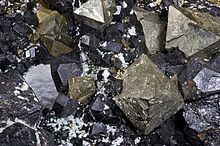Schikorr reaction
The global reaction follows: It is of special interest in the context of the serpentinization, the formation of hydrogen by the action of water on a common mineral.
Anaerobic oxidation of carbon steel of canisters and overpacks is also expected to occur in deep geological formations in which high-level radioactive waste and spent fuels should be ultimately disposed.
This deals then with the service life of concrete structures, amongst others the near-surface vaults intended for hosting low-level radioactive waste.
The trends to expansion of H2 bubbles and the resulting tensile stress can generate cracks in the metallic alloys sensitive to this effect also known as hydrogen embrittlement.
For detailed reports on iron corrosion issues related to high-level waste disposal, see the following links:

